#but it feels unlikely?
Text
I know I should really stay out of the discourse, but I gotta say it feels weird how I've seen multiple posts talking about how hard it is to like Imogen while acknowledging her flaws, meanwhile I've had to scroll past dozens upon dozens of posts(some of them from the same people saying this about Imogen!!!) crying about Orym being demonized because somebody dared suggest that maybe one of his actions was a dick move
#idk maybe its just the people I have blocked that are skewing my perception#but it feels unlikely?#die-hard Liam character stans are usually the ones im fastest to block#(disclaimer: I like most of Liam's characters Vax is one of my favorite cr pc's across all campaigns)#it just feels like there's a double standard here#(there is another thing here about this fandom having a need for femslash shippers to be this ultimate irration fan boogy man#but im restraining myself from going into that go me)#cr discourse
19 notes
·
View notes
Text
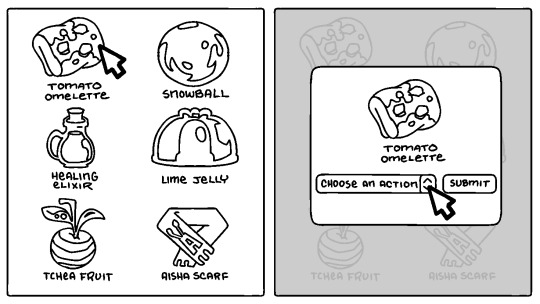
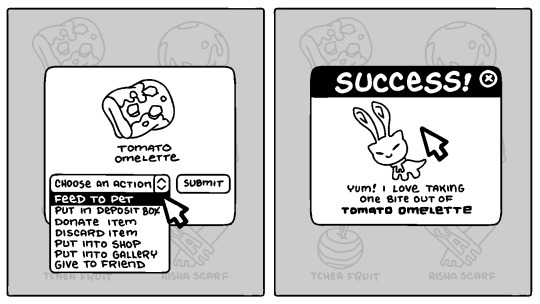
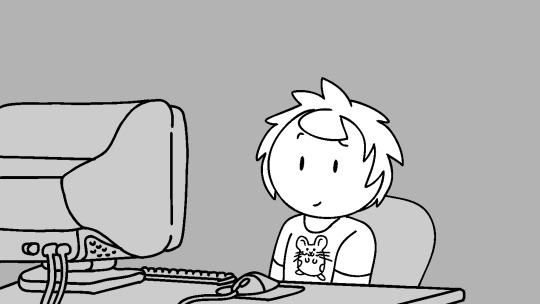
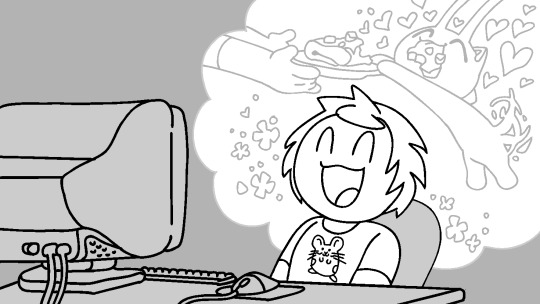
the continued adventures of an internet user who was frozen in 2004 and defrosted in 2021: some things are just the way you left them
previous 2004 internet user comics are here: one, two, three, four, five; or just in my 2004 tag
#2004#art#comic#comics#internet#nostalgia#neopets#aisha#february 2024 art#2024 art#02132024#did i... forget to upload this one on tumblr in february lol#too distracted by mewtwo's birthday i guess#i have been playing neopets since elementary school#we're talking barely sentient#and i still play every day#it's not really my intention to make a low effort Relatable Comic here#but to capture a specific feeling i have when i feed my neopets#pet sims are unlike anything else to me#they just have this feeling about them that is more intimate than other games even when it's basic text and images#i guess that's why my comic is like#Pet Sim But Sad#lmao
4K notes
·
View notes
Text

i’d like to think i’m funny
#unlike the frankenstein playlist i'm not keeping this one up lol it's not going to grow beyond this#unless someone knows a song called ''i kinda feel like dancin' but i'm not sure'' or smth like that
107K notes
·
View notes
Text
God, the intimacy of Astarion feeding from you.
Astarion drinking from your neck as he pulls your body closer to his in bed, his chest up against your back, his arms wrapped around your waist. It's a casual thing, now, his whispered can I? and your answering nod, as much a part of your bedtime routine as your bath or his curl care. You sigh as his fangs pierce your skin and his fingers flex against your stomach. His breath hitches when the taste of you hits his tongue, and that's familiar too, the physicality of it, the noises he makes low in his throat as he drinks, the way he grows warmer against you as your blood begins to flow through his veins. Nothing else makes you feel so heady, so intoxicated- so comforted.
Astarion drinking from your wrist when he’s starving for it and can’t wait to get you more comfortable. Pulling him into an alleyway one night on the way home from the Elfsong because you can see how badly he's craving in the way he can't keep his eyes off of the pulse point in your neck. He seizes your arm with both hands (can I? Yes-), bringing the soft skin on the inside of your wrist to his lips. He has just enough presence of mind to kiss the heel of your hand distractedly before he bites, fangs sliding through your skin and into the vein. The sound he makes can only be described as a growl, something feral and possessive (and you'll never tell him that it turns you on, since he would be insufferable about it- a promise to yourself that lasts exactly as long as the space between the moment and the next time you're tipsy and want him).
(NSFW Below!)
Astarion drinking from your inner thigh, one hand holding your leg steady and the other cupping your cunt. You groan, eyes shut in pleasure, as his thumb comes to rub your clit. The pain of the bite is barely pain this way- it collides with the pleasure in your belly and sends you almost out of your mind, overwhelmed with sensation and heat. He takes you all the way there, takes just enough from you to have you relaxed and pliant and soaring somewhere above your own body, plays you like an instrument with all the knowledge of you he's gathered over the months, the years. He knows when you're close, knows to crook his fingers inside you just so, knows the reaction he's going to get when he pulls away from your thigh for just a moment and looks up at you with dark eyes and tells you to come for him, he wants to see it, you fall apart so beautifully and it's all for him, isn't it, tell him how good he makes you feel and when you climax with his voice in your ear and the scent of blood on the air he has the audacity to laugh at how well he understands you, your body.
He's soft, after, softer than he'll ever be with anyone who isn't you. He licks you clean before he takes you to the bath, carrying you with the strength your lifeblood gives him. It's the least he can do for you, with everything you've given him: not just your body, but your trust, your closeness, and he will never stop being grateful.
#astarion x you#astarion x reader#astarion smut#astarion x tav#astarion bg3#.astarion#.nsft#i'm never gonna be normal about this sorry. one day y'all are gonna get a dissertation on the incredible intimacy of sharing blood#side note but...i feel like astarion doesn't usually feed during penetrative sex because he Will just lose his mind. feral. out of control#he makes that mistake with you one (1) time right at the beginning of the romance in act 1 and swears he will NEVER do it again (lying)#anyway. my askbox is open. for like minds. and unlike minds actually
1K notes
·
View notes
Text
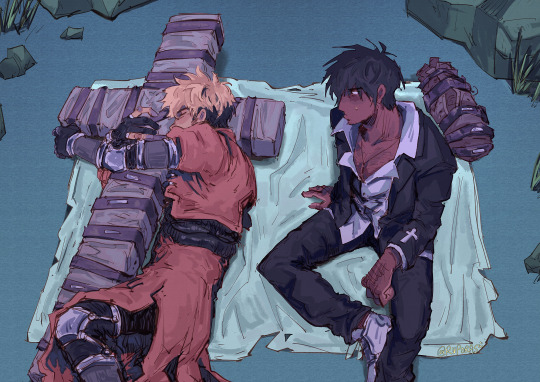
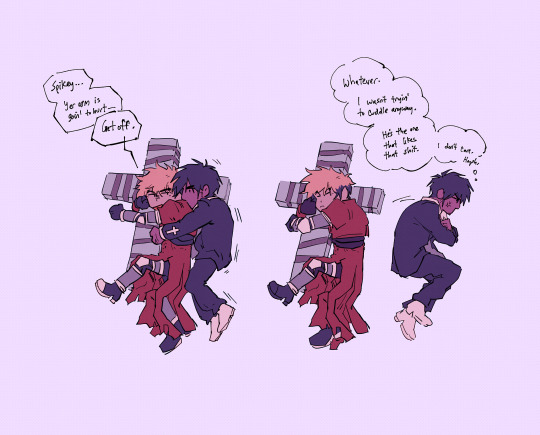
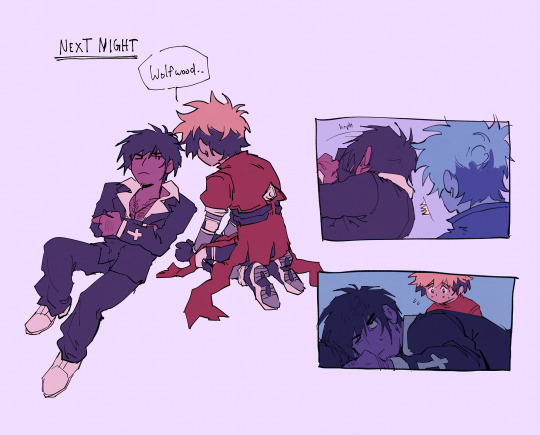


being a little petty (ID in alt)
#vashwood#vash the stampede#nicholas d wolfwood#trigun#trigun maximum#petty vash moment - i think he deserves the chance to be petty... and he's kind of a petty person to me in some circumstances mfgksmgk#DEFINITELY to wolfwood i'd imagine... because they're petty to each other in exchange for not speaking about their Feelings or sorting#things out verbally. it's just how they communicate. not outlandish fights - or ignoring each other completely - but just little petty ways#that ends up getting solved anyway. i imagine it always tends to be wolfwood who “solves” it while vash doesn't necessarily “solve” it#he just ignores it? or accepts it as is? like broods for a day maybe in unnoticeable to anyone but ww kind of way but#returns to a normal attitude the next day while ww is like ??? fuck this guy - before ultimately just accepting it as is because he doesn't#/want/ to be mad at vash. i also dont think ww is someone who can be mad for super long... unlike vash who's had anger for like 150 years#ruporas art
4K notes
·
View notes
Text
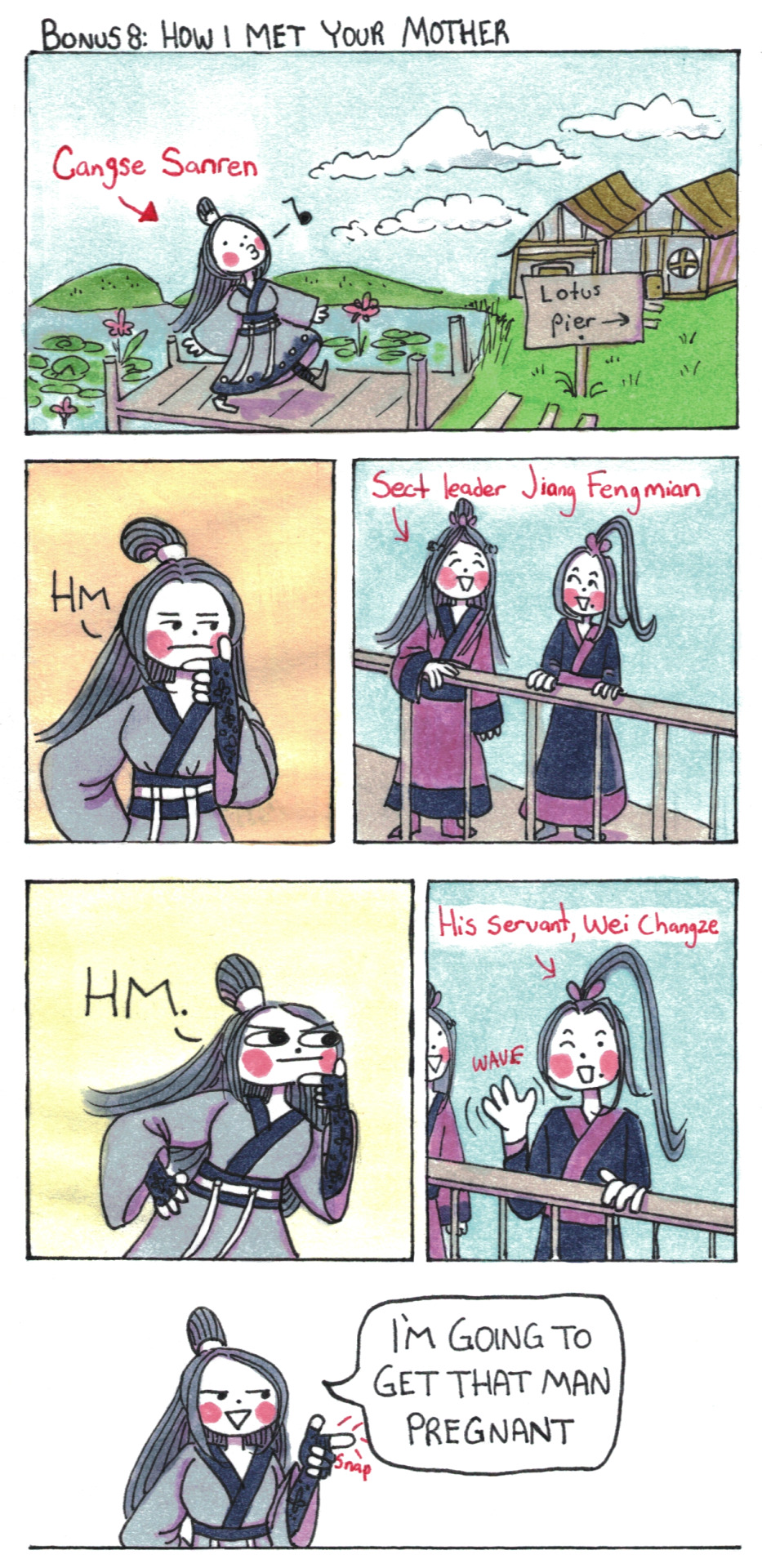
Bonus 8: How met your mother (CSSR design by @qourmet!)
[First] Prev <–-> Next
#poorly drawn mdzs#mdzs#cangse sanren#wei changze#jiang fengmian#It was important to me that WCZ had the hereditary mole. I will die on this hill.#I have been *waiting* for the day to finally arrive when I could finally make this comic. It's been marinating for months.#My mission is to redraw all of qour's character designs one day. They are just *that* good.#CSSR has the vibes of a wandering menace who shows up in towns like a stray cat arriving at a new doorstep for treats. 10/10.#While YZY strongly leads us to believe that JFM was in love with CSSR and that's his whole motivation behind taking wwx in-#-I do think this is (once again) rumour being presented as reality. It's the juicer story to tell after all.#It is still possible that he did love her! But I think that story undercuts the relationship he also had with WCZ.#Yall ever think about how JC and WWX parallel their fathers? How Wei Changze also left the Jiang Leader's side? I do.#Unlike JC though It is far more hilarious and plausible to imagine JFM begging to be CSSR and WCZ's third. You know he would.#My wild headcanon is that JFM and YZY are in a mlm and wlw arranged marriage situation. Deeply unhappy as partners. Better as friends.#they care for each other and I'll admit that there is a beautiful tragedy in them having romantic feelings for each other the whole time.#But I am also here for the gaffs. Let them be unfulfilled homosexuals together.#Meanwhile cssr and wcz are having incredible hetrosexual sex in a bisexual way that WILL leave him pregnant by the end of it.
2K notes
·
View notes
Text
i really like how canonically yuu is genuinely supportive of grim wanting to be a great mage. if i recall correctly, even character voice lines point this out. and it seems like yuu dotes on grim a lot and defends him too??? yuu even encourages grim's ambitions whenever he declares wanting to be a great mage. and also when he does that boss-henchhuman dynamic. i mean yeah you can interpret it as yuu saying that being condescending and sarcastic as if they're talking to a child saying "when i grow up i want to be famous!" but like. i really think they're genuine when mc loves grim in their own way.
even if grim is usually a menace, he's become like family to yuu.
and i'm pretty sure grim feels the same way.
think about it this way. despite all the mess, all the unpredictability, the danger, and all the drama being in nrc. what's always the constant? yuu goes home at the end of the day to the ramshackle dorm (basically their home at this point considering they slowly but surely fix it up over time) and with who? “the great mage” grim. as the sole outcasts in that academy, they both sleep soundly knowing they will always have each other at the end of the day.
#2nd anniversary event got me feeling things#and honestly just thinking about that grim overblot theory#if that's true i believe grim's breaking point would be yuu finally beginning to leave through the dark mirror#and then overblotting leaving the dark mirror room in ruins like we see in the beginning of the game#he does not want them to leave#they WILL stay there#the great grim refuses to be alone in that “ramshackle” dorm#[—#twisted wonderland#twst#twst grim#twst yuu#twst ramshackle#★ twst rambles#—]#god at first grim was REALLY made to be unlikeable#then overtime (personally) grim had just really grown on you#i will defend grim with my life now >:(
1K notes
·
View notes
Text
the jodi arias/travis whoever murder was truly the ultimate fuck around and find out situation, like...ok so you're gonna willingly continue to associate with a woman you know is mentally ill and obsessed with you just so that you can have degrading sex with her while also constantly insulting and ridiculing her to your friends behind her back? stringing her along w/the hope of a serious relationship, while you really just think of her as an object for you to fuck & then discard with no consequences? lol. bet. hope you like being stabbed 37 times
#i dont feel even slightly bad for saying this. check the comments under any murdered woman and there will be men blaming her#especially if it was her husband who did it and ESPECIALLY if she was trying to divorce him#so yeah. unlike those women travis had it coming#that mormon moron was a degen#jodi arias#LX3 op
1K notes
·
View notes
Text
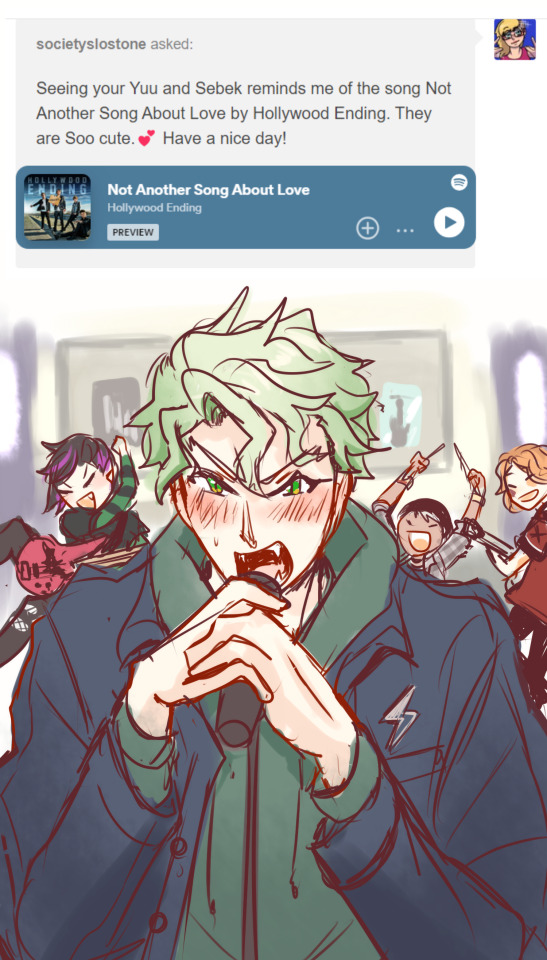
#twst#twisted wonderland#sebek zigvolt#okay but DAMN??? THIS RESONATES so well with how they have been interacted with each other???? I ACTUALLY FEEL TOUCHED *SNIFF* *SOBS*#IT'S VERY UNLIKELY but i can't stop imagining SEBEK SINGING IT NOW especially the I HATE I HATE I HATE PART SO HIM AUGHH THANK YOUU??????#lilia vanrouge#kalim al asim#cater diamond#light music club#fanart#GOD LOOK HOW GOOD HE LOOKS WITH LIGHT MUSIC CLUB#he might not even need microphone BCS HE IS SO LOUD ALREADY#BUT DANG#i mean it could be that the mic is not even ON HFSHDH bcs the club member just wisely thought so#look at this boy having his clothes and hair set up by the club members#HE LOOKS SO GOOD AND YOUNG#MUCH YOUTH#AUGHHHH...............#THE MUSIC CLUB LOOKS SO CHEERFUL AS WELL IT LOOKS SO FUUUNNN AHHH!!!!!!!!!!!!!#who knows who knows lilia worked on his influence 'magic' to get sebek to do thiss#augghhh i can dreeammmmmmm
840 notes
·
View notes
Text
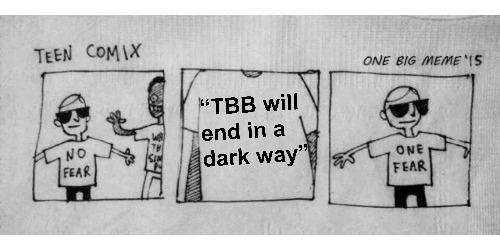
THE WAY IT KEEPS BEING MILKED BY TBB CREATORS/VIEWERS HOW DARK THE SECOND HALF OF SEASON THREE WILL BE IT CONCERNS ME
#our dreams of a happy family on Pabu just feel more and more unlikely#please this hyperfixation has been my life#I just want it to end with everyone alive#and happy#I mean they have a dog and dogs can’t die so maybe they all will live happily in the end#the bad batch#tbb#star wars tbb#tbb hunter#tbb crosshair#tbb omega#tbb echo#tbb wrecker#tbb season 3#tbb spoilers#tbb season 3 spoilers#the bad batch spoilers
450 notes
·
View notes
Text
Don't want to put this on the post itself for risk of derailing it, but that post the other day about Terry Pratchett's early work really stuck in my mind. OP had sent in an ask saying that they heard some of Pratchett's earlier works had problematic elements (not unusual for a male english writer in the 80s) and they weren't sure whether to go ahead with reading the work anyway.
What I really want to ask that person, or indeed all persons who are hesitating over whether or not to read problematic works or works by imperfect authors:
What are you worried about happening, if you read a work with problematic elements?
I'm worried that if I read this art, I will run across hateful images or words that will shock or upset me
I'm worried that I will spend money on a work of art that then financially supports a bad person, and that thought makes me uncomfortable or upset
I'm worried that I will read works of art written by a bad person, and comment or react on them, and other people will see what I am reading and will think less of me because of it, or will assume that I hold the same bad beliefs as the author
I'm worried that I will read works of art written by a bad person, and I will enjoy them, and the author will find out about my enjoyment and feel emboldened to do bad things because of it
I'm worried that I will read works of art written by a bad person, and their badness will contaminate my way of thinking and make me a worse person in turn
Because these are all different answers and some of them are more actionable than others
#salty sunday#for the first: it's up to you whether you want to take that risk but keep in mind you can always stop if you feel discomfort.#this isn't school and nobody is going to require a book report from you on it#for the second: whether the author is even still alive let alone receiving proceeds from the work is something you can check on#if they're a more classic author and their estate/family is still getting proceeds you can decide whether you feel the issues of the author#are something worth punishing their family over#for the third: you can't control what other people think. don't try.#for the fourth: the author is gonna think and do whatever they think and do entirely independent of the response of the audience#assuming they even found out what you think ever which is very unlikely. see above about not being able to control what other people think#for the fifth: moral contamination is not a thing. kick the little fascist voice out of your head. be free
896 notes
·
View notes
Text



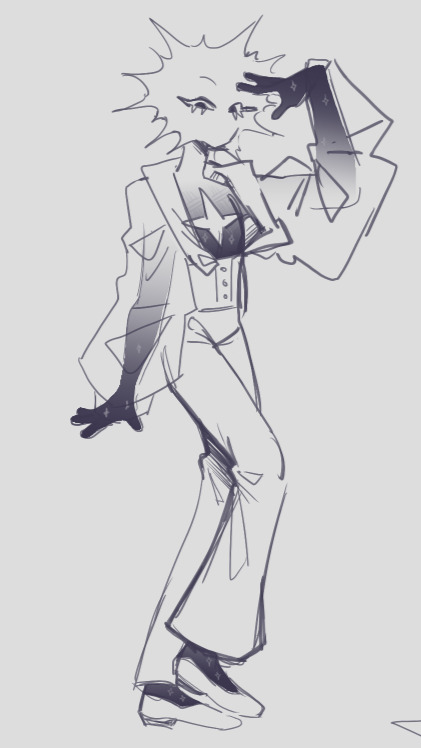
Trying to remember how to Clip Studio Paint again
featuring: Loop
#isat#in stars and time#isat loop#my art#desert art#art tag#problem at hand: I like how I stylise Loop's eyes but the shape is very hard to replicate#solution: trying to simplify the way of drawing it#because I can't do it in one take unlike in traditional (my hand is better trained for traditional)#the last img is just me beaming self-indulgence because I want to give Loop post-game clothes but I NEED THEIR STAR TO BE OUT#this is nowhere close to what I'd put them in though cause this doesn't feel very Loop-y to me
620 notes
·
View notes
Text
Hello Rise fandom 🤗

#some of my old rise art has been getting attraction again here#and it made me reminisce on some of my old art#particularly my fake Draxum screenshots of the movie#and it made me miss some of my headcanons for the characters#specifically how I believe Leo and Draxum would not get along well as father and son#unlike his brothers who I think eventually would warm up to Barry#so I got thinking what if I’m this moment Draxum was the one to save Leo?#I feel like he’d have a parental instinct (much liek Raph’s older brother instinct) and put his life on the line#and I feel like I’m that moment Leo would have realized how much he meant to Draxum as a son#I went with an angstier vision ofc#but I still executed my vision with this redraw 😤#rise of the teenage mutant ninja turtles#rise of the TMNT#ROTTMNT#rise of the tmnt leonardo#rise of the tmnt Leo#rise of the tmnt draxum#rise of the tmnt Baron Draxum#rottmnt Leo#rottmnt Leonardo#rottmnt baron draxum#rottmnt draxum#save ROTTMNT#save rise of the tmnt#art#digital art#my art#fanart#redraw#fake screenshot?
455 notes
·
View notes
Text
crowley perhaps did the bravest thing in his 6000 years of existence and was greeted with his worst nightmare in return. i’m sooo incredibly normal
#good omens#good omens s2 spoilers#go2 spoilers#gos2 spoilers#good omens spoilers#good omens season 2#i am . devastated#that’s the closest word to it#but fuck . phenomenal season and ending for making me feel so many shrimp emotions#jay rambles#shoutout to ineffable bureaucracy . real winners in all that#nina and maggie won too because now that theyre on the same page they’ll actually be able to develop a healthy relationship#unlike SOME OTHER PEOPLE#1k
2K notes
·
View notes
Text
CLASSES - a comprehensive guide
The first thing that needs to be said is that there is no such thing as a "bad" class. All of them have the potential to be a great detriment OR great boon to the rest of the team, depending on how far along the journey of self-actualization a party member is. Some may have steeper challenges, but this corresponds with greater rewards.
The second thing that needs to be said is that all players are part of a team, and all personal journeys and playstyles are interlinked. No class is truly "solo." Even the smallest viable session is still two people, and even the most suitable classes for solo play are stronger when they're in a party.
The last thing that needs to be said is that the game wants you to succeed. The game, inherently, wants every player to reach godhood, wants every player to self-actualize, wants every player to win. It respects free will and free choice, so it will allow for failures (and, indeed, doomed timelines are vital to the alpha one existing), but Skaia is ultimately optimistic, and tries at every turn to ensure that a golden ending is possible.
Because, after all, SBURB/SGRUB - and Homestuck itself - are about children growing up, maturing, and learning compassion for each other. About fixing their flaws and rejecting the negative aspects of the society they came from. It's about how it is our duty, our responsibility, to become kind, mature people who care about one another, because we will one day be responsible for creating a new society.
And so, without further ado:
ACTIVE (-) Classes and PASSIVE (+) Classes are described with the dichotomy of "powers working for the self" vs. "powers working for others," but I believe this to be an oversimplification of what the active and passive split is. Both active AND passive classes benefit from being in a party; however, an active class will gain fewer party benefits in exchange for being more suited for solo play, while a passive class will be less suited for solo play, but confer much greater benefits to party play.
This is reflected in their personal quests: while active classes and passive classes will both require intervention, empathy, and guidance from their teammates, the struggle of an active class is usually one of grappling with internal flaws, and the struggle of a passive class is one of grappling with interpersonal or societal relations. In other words, the personal quest of an active player will usually involve getting therapized, while the personal quest of a passive player will usually involve addressing a systemic societal issue. Often, both will be required, but whether a class is active or passive will indicate an area of focus.
KNIGHT - / MAID +
PARTY MANAGEMENT
one who wields [aspect] or leads with [aspect] / one who distributes [aspect] or manages with [aspect]
KNIGHTS (-) are a very flexible and versatile class; "wielding" their aspect does not necessarily mean they are skilled at DPS. It actually indicates the way a knight interacts with their aspect, a very straightforward relationship of tradesperson and tool, or soldier and weapon. Similarly, while a knight does not always take up the "leader" position in the party, they will be the "spearhead," a point behind which the other players rally, a beating heart keeping the party together.
This straightforward relationship between a knight and their aspect leads to knights finding little difficulty mastering their aspect once they've begun. Many knights are, in fact, instinctively drawn toward utilizing their aspect, in the same way that they are naturally drawn toward roles of importance or heroism.
Knights often struggle with their perceived place in society, as well as with their innate sense of self and self-worth, seeing themselves as outcasts, resenting the responsibility placed on their shoulders, and fearing vulnerability. Unaddressed, these issues will lead to knights who actively become a detriment to party success. For example, they can dismiss valid concerns, shirk their duties, and in the worst case scenario, actively lead the party down the wrong path, invoking their natural ability to lead for ill.
Therefore, a knight's journey is one of accepting themselves and accepting their duty to better the world. It is about coming to terms with their own insecurities and learning to rely on others. It is about learning to take responsibility, and accepting the banner of a just and glorious cause.
A fully realized knight will be the center of every charge, the guiding star behind which the other players rally. They can provide clarity and guidance to those still on their journeys, and peace and comfort to those who are struggling or in pain. Where the knight goes, the party will follow, as a unified and united front.
MAIDS (+), meanwhile, tend to be on the backlines. If the knight is the forward march, then the maid is the supply line, an incredibly vital role whose absence is disastrous, even if its presence is nearly invisible. Maids have a nearly infinite well of their aspect to distribute, and are uniquely talented at managerial duties - keeping players on task, patching up the holes in a plan, sourcing and supplying resources, so on and so forth.
This is not to say that maids are relegated to support roles - a maid is usually capable of holding their own in combat just fine, especially if they've been endowed with a more combat-suited aspect. Both knights and maids are extremely versatile. That being said, maids truly shine when they're able to take on these backline roles, and many maids are more noticeable by the devastating effects of their absence rather than the invisible touch of their presence.
However, they are the class that most often starts in subservient conditions - low status, strict duties enforced upon them, so on - and their personal journey is a constant struggle against the control of others. Maids whose parties fail to grapple with and undo these shackling forces will find their maids succumbing to the influence or control of malicious entities; in the worst-case scenario, a maid can become an actively hostile enemy or saboteur, invisibly pulling the party's strings and setting them up for failure.
Therefore, a maid's journey is about rejecting societal oppression and throwing off the chains that bind them. A successful maid rises to become the head of the household - nothing occurs within the game that does not first pass the maid's inspection, and their touch ensures that there is a place for everything, and everything is in its place.
A free maid, who belongs to themselves, incomparably increases a party's efficiency. Every communication line is clear, every distribution route is clean, every mystery is solvable, and every plan is airtight. A maid guarantees that nothing can ever go too wrong.
PAGE - / HEIR +
TEAM BONDING
one who must earn [aspect] or inherits the mantle of [aspect] / one who is beloved by [aspect] or awakens to [aspect]
PAGES (-) start the game with the fewest benefits from their aspects, but the greatest potential for growth. Theirs is a constant battle with the self; they are often cowardly and naive. They possess sensitive souls, and while it is incredibly easy to hurt a page, it's much more difficult to build them up. Because of the difficulty of raising this class, it's practically defined by its journey - a constant struggle against the self - rather than its destination, and the powers the class confers.
Pages, like heirs, are classes of inheritance. A page is promoted by trials and tribulations and comes to inherit a greater power than they begin with; in the same way, the class will one day come to embody its aspect, although the road will always be turbulent and long. Moreover, it is a journey without end; pages, being as sensitive as they are, are the most prone to backwards progress, even after reaching their peak.
They prone to staying weak throughout the entire game, never self-actualizing past being the party joke. They attract the obsession and ridicule of stronger-willed players, and their mistreatment can become extremely divisive. A page can easily become a party's albatross, the epicenter of massive interpersonal conflicts, which can tank an entire session.
Therefore, a page's journey is one of the most difficult of all - that of teaching others how to care about other people. Pages rely on great patience, kindness, and understanding. Their sensitive souls must be carefully nurtured and propagated with love and attention. In the same way that a page can tear a team apart, they can bring a team together, all in the name of compassion and empathy. A fully-realized page is the symbol of a party that has linked hands with one another.
Self-actualized pages, as a result of the difficulty inherent to the class, are incredibly powerful and versatile when fully realized. Inheriting the mantle of their aspect, they become pure embodiments of their aspect, capable of achieving impossible feats of raw, unfiltered power, and inspiring all those who gaze upon them.
HEIRS (+) begin the game very strong, but have a difficult time becoming stronger. This is because their usage of their aspect is very instinctual to them, even at times being entirely beyond their control, hence, "beloved by" in the class description. However, because of how naturally their aspect comes to them, it makes taking further command of their powers difficult.
An heir "awakens to" their aspect because their natural, intuitive control often renders them too comfortable to grasp the greater implications of their class. As an inheritance class, heirs can come to embody their aspect, transforming entirely into it. Their challenge lies in breaking out of their comfortable shell and learning how to utilize their powers in more active, intentional ways.
This is reflected in their personal quests. They are often set to inherit great privilege or wealth prior to entering the game, and are thus naive to the realities of the suffering and pain of others. Without a supportive party willing to challenge their views, heirs can perpetuate that pain by submitting to their place in the world, becoming a divisive force within the party, or, in the worst case, losing themselves to their inheritance, and submitting so wholly to their aspect that they become lost to the rest of the team.
Thus, an heir's journey is to question the stratification of the society they belong to, so that they can recognize and address its flaws. They must learn to interrogate their inheritance, separate it from themselves, and reconcile with it. Theirs is an arc of examination and understanding, descending from their position of privilege and peace to learn about the suffering of others, and deciding that they wish to do something about it.
With full command over their aspect, and a clear vision for how it ought to be distributed, the party gains a new and powerful ally - the aspect itself, which will come to embrace the entire party as family. A fully-realized heir connects the privileged and underprivileged, spreading their inheritance to all.
MAGE - / SEER +
GUIDANCE
one who invokes [aspect] or is drawn to [aspect] / one who comprehends [aspect] or is guided by [aspect]
MAGES (-) are a class of prophets, although saying they "see the future" is misleading. Rather, mages "invoke" the future, collapsing causality to align to their desires. Most mages remain unaware that they are doing so until well into their journey. While all players weigh on the scale of causality, affecting both past and future events, and which sequence of events is the "alpha" sequence, mages have the most direct effect.
Because of this ability to invoke future events, mages possess powerful buffing/debuffing abilities. Furthermore, as one of the two knowledge classes, a mage usually has a very deep understanding of their aspect, and an intuitive knowledge of how the flow of time and causality function. They are "drawn to" their aspects in this way, instinctively searching out points where their influence can affect the flow of events.
However, with great power comes great cost; the mage class is usually assigned to those who are stricken by tragedies and prone to negativity and self-loathing. Mages often begin the game as a detriment to the party, "prophesying" future events that leave the party - including themselves - at a disadvantage. In the worst case scenario, a mage can invoke certain doom for their party or themselves.
Therefore, it is vital that a mage address their tragedies and be given a chance to heal and grow. The ones most struck by tragedy, theirs is a journey of reclaiming lost joy and rediscovering lost hope. However, the transformation is powerful once completed - as the one who suffers tragedy and loss most intimately, a mage can also come to be one of the most empathetic and compassionate members of the team.
If a mage is uplifted, and capable of believing in a kinder and gentler world, then their ability to invoke the future - and the aspects of their aspect that they are drawn to - become kinder, as well. Pain and suffering still have their place, but the ending will be a happy one. With a fully empowered mage, the future will always be better than what came before.
SEERS (+) see multiple branching paths. A mage determines where a road will be built, but a seer tells you where a road CAN be built. They are also often gifted with knowledge of the game and its mechanics, and are especially uniquely gifted with understanding of their own abilities. In this way, they "comprehend" their aspect.
Seers themselves are not particularly gifted in combat through their classpect alone; however, in exchange, they often play a vital role in steering the party. They are the game's built-in guides, with an intuitive knowledge of the game's victory conditions, as well as an instinctive desire to lead others along their paths. Seers are, therefore, one of the most important classes in the game, when one is present.
However, the ability to see is a burden as well as a gift. Seers find themselves paralyzed by choice, and often doubt their own abilities to choose "correctly." They are prone to becoming mired in what-ifs, and struggle with political or ethical debates with no clear answers. In the worst-case scenario, a seer may feel so cursed by their sight that they self-destruct, and deliberately choose poor or incomprehensible answers, in an attempt to free themselves of their sight.
Thus, a seer's quest is, ironically, to see the world beyond the purview of their aspect. They must come to have a more comprehensive understanding of the world they live in, and what purpose they are trying to achieve, so that they can feel confident in the choices they make. A seer is often blind - their journey, therefore, is that of regaining their vision, by connecting with the world outside their inner sight.
A seer with a clear vision for the future will always know exactly which path to choose. A party with such a seer in it will never be stuck and never be lost. If there exists a path to self-actualization, the seer will know it. And if there exists a path to a breathless and perfect victory, a fully-realized seer will light the way.
THIEF - / ROGUE +
UTILITY
one who steals [aspect] from others or steals with [aspect] / one who steals [aspect] for others or steals from [aspect]
THIEVES (-) are a very difficult class to play. They start out with almost no passive abilities regarding their aspect, and their ability to actively use their aspect is contingent on their ability to first "steal" it from someone else. Thus, they are always playing a game of resource management, and there is always a chance for them to be left helpless after a heist gone wrong.
However, their gimmicky nature allows them to overtake other classes even in that class's specialty, if they can set up the exact right circumstances and manage their resources well. This makes them incredibly versatile, especially when a thief is working together with a party, and thus able to count their party among their potential resources. It takes great cunning to play the thief class well.
However, this also makes the thief a potentially dangerous element to the rest of the party. Thieves are often egotistical and self-serving, willing to see enemies and allies alike as resources and tools. Unaddressed, their reckless, selfish natures will earn their teammates' distrust and enmity. In the worst case scenario, a thief running rampant can severely harm the party, or earn so much ire that the party turns against them.
Thus, their journey is that of realizing that their selfishness and ego are flaws - the classic parable of "money doesn't bring happiness." Beneath their uncaring surface lurks genuine emotional distress; a thief must come to realize that their greed and selfishness is an active detriment not only to the people around them, but their own selves. Only then can they heal from their injured souls.
A thief that has undertaken this journey is one who has realized that they are stronger when they are working with others. Their versatility, creativity, and cunning are incredible assets once harnessed toward the will of the party. No situation will ever be inescapable, no safe uncrackable, and no problem unsolvable - not if the thief has anything to say about it.
ROGUES (+) are similarly difficult to play. Unlike the thieves, rogues do see passive benefits from their aspects. However, their active abilities are much less straightforward, and rogues often struggle with understanding them. A rogue's role is to redistribute wealth - thus, "stealing for the sake of others."
A rogue, being able to steal directly from their aspect, truly shines when given enough time to prepare. If a thief must fly by the seat of their pants, then a rogue is a heist planner - they have an infinite box of tools to pull from, if only they know what tools they'll need for the job. This makes them incomparably versatile, even if not necessarily in the heat of combat.
Rogues take on the mantle of challenging the status quo. They usually begin the game already in opposition to their society, seeking out better alternatives and considering unorthodox options. However, not every party is ready for a rogue's radical ideology, and not every rogue has considered the full consequences of their belief in change; in the worst case scenario, the rogue can become outcasted and disregarded, or cause an upheaval that proves disastrous, rioting for the sake of rioting.
It often requires the help of others for a rogue to understand how to use their powers. In the same way, it requires the party's honest communication and exchange of ideas to help a rogue grasp exactly what form their rebellion ought to take. A rogue knows instinctively that something must change; their journey is learning how they ought to go about it.
Once they do, a rogue - given enough time to prepare and plan - is the ultimate utility player, having the right tool for every possible situation. Their abilities are only magnified in a party setting, as their teammates become variables that unlock new possibilities. A party with a fully-prepped rogue always has a perfect plan, a way to solve any problem that they might face.
WITCH - / SYLPH +
AREA CONTROL
one who manipulates [aspect] or achieves dominion through [aspect] / one who nurtures [aspect] or creates a land of [aspect]
WITCHES (-) carry with them the winds of change. A witch manipulates, changing properties of their aspect and their aspect's effect on others, creating a "territory" over which they rule. They see few passive benefits of their aspects, in exchange for their active abilities being so all-encompassing and overwhelming.
Once their territory has been established, witches make the rules. Their changes can be permanent, temporary, massive, and miniscule. However, a witch "achieves dominion" with their aspect - this means that they must first struggle to create this domain, and it's difficult for their abilities to manifest until they do, often leaving younger witches weak and vulnerable.
Witches have strong feelings for how things should and should not be, but not necessarily grounded ideas for how to implement them, often due to some "outsider" status in society. Unfocused witches become dangerous for the party, as they are easily manipulated; in the worst-case scenario, they can fall in with malicious forces, who can sway a witch's turbulent heart and utilize them as a force for negative change, rather than good.
Thus, a witch's journey is that of interrogating right and wrong. A witch must struggle with morality and ethics, and come to clarify their own beliefs; only then can they know what sort of domain they wish to establish, and what sort of rules they wish to enforce. Once they know their own hearts, they can shake off the insidious whispers of malicious external influence.
As if a reward for their struggles for autonomy and independence, the witch is the one whose will is most imposed on the world that comes after them. Just as an evil witch putrefies the world around them, a fully-realized witch who has decided to use their influence for good can create a near-utopia.
SYLPHS (+) call to mind the images of fey folk who sprout plants where they walk. That is how a sylph "creates a land" of their aspect - merely by existing, the world around them becomes suffused by it. A sylph's mere presence nurtures, grows, and heals their aspect; unlike witches, who manipulate what is already there, sylphs can create something from nothing.
The establishment of their domain comes naturally to them. Those caught within it are on the receiving end of their aspect, whether they want to be or not. In exchange for such powerful passive abilities, a sylph's active abilities are weaker, and usually unsuited for solo combat, generally being of healing, buffing, or debuffing nature.
A sylph is prone to selfishness - to luxuriating within their own land, their own aspect, their own mind. They often have difficulty connecting with others and understanding why their own personal world may not be to the liking of the world outside of themselves. Often, they are aloof. An unrealized sylph can cause great harm to the world around them, their domain choking out and smothering their party; in the worst case, they can mire their party within it, leaving their party unable to proceed.
Thus, it often requires the outside world to breach their safe haven in order for a sylph to grow. They must be made uncomfortable, and then made to accept that uncomfortable things are also important - maybe even more important than comfort, at times. Growth often requires pruning; a sylph's journey is to come to understand that good intentions may lead to harm, and, vice versa, that harm can often lead to true growth.
Sylphs can provide the greatest compassion and emotional comfort within a party, encouraging - if not enabling - their teammates' growth in their personal journeys. Once a sylph understands when it is appropriate to encourage, and when it is appropriate to pull back, there is no refuge safer for the party than the sylph's domain.
PRINCE - / BARD +
OBSTACLE REMOVAL
one who destroys [aspect] or destroys with [aspect] / one who allows the destruction of [aspect] or allows destruction through [aspect]
PRINCES (-) possess the ability to annihilate, a destructive class not limited to physical or tangible objects. Princes also enjoy auxiliary benefits as befits their royal titles - many princes start the game with great talents, great status and wealth, or both. They are also endowed with royal presence; their very existence provokes strong emotions from those around them, for good or for ill.
One of the more straightforward classes in the game, a prince's ability to destroy most commonly manifests as DPS. However, their abilities encompass a greater scope than mere damage - the prince's ability to annihilate figurative or metaphysical concepts makes them capable of directly removing any obstacles that stand in their way. As if hungry to consume their aspect, they are naturally drawn towards where it congregates.
However, with great power comes great responsibility: princes are often the most psychologically maligned within the party, and their destructive talents can very easily become self-destructive instead. Usually the result of societal pressure, trauma, and suffering, a prince is prone to embodying the lack of their aspect, rather than its presence. In the worst-case scenario, a prince spreads this misfortune to the rest of their party, destroying the presence of their aspect from their session altogether, often taking themselves along with it.
A prince must be shown compassion. Though they are often viscerally unpleasant to engage with, turning a blind eye to foolishness, loneliness, and suffering - which a prince embodies - is one of the worst things that a party can do. Though the effort at times seems undeserved, to heal a prince requires a staunch belief that there is good to be gained if we are kind to each other. This kindness will be returned; once you are counted among a prince's "people," they will do anything to keep harm from befalling you.
A prince, once shown this grace, is incomparably powerful. To destroy their aspect or with their aspect is the ability to destroy nearly anything, including concepts such as despair, death, and doom. As if proclaiming a royal decree, a fully-realized prince can banish misfortune and ill tidings altogether, leaving nothing standing in the party's way.
BARDS (+) are a wildcard of a class, often responsible for a party's improbable victory, abject defeat, or both. Their abilities are not very well-understood, even by the bard themselves, and they often utilize both passive and active abilities intuitively, unaware that they are doing so. The morale of the party is deeply tied to the bard's own, and it's unclear which side is cause and which is effect.
The ability to allow the destruction of their aspect, or invite it through their aspect, is actually something of a debuff rather than DPS - the bard's ability is to break unbreakable shields, tear down unclimbable walls, and nullify unstoppable forces. Rather than dealing damage themselves, they allow for damage to be dealt that would otherwise have no effect - in other words, by nature, they make the impossible possible. This is the true source of their ability to evoke "miraculous" situations.
Bards are inextricably tied to society - after all, their tales only hold as much value as their relevance to the audience. This means those with the bard class are invariably molded by the worst aspects of the society they come from. They serve as living embodiments of the most unpleasant aspects of society, and living reminders that leaving these elements to fester only means they will multiply in severity. If these beliefs are allowed to go unexamined, bards will always steer a party towards ruin.
Therefore, a party must engage with the bard earnestly, compassionately, and openly, and help them see the errors of the past. A bard must be led, with gentle guidance and genuine openness, to discard their harmful beliefs, and sing a new, more beautiful tune.
A bard that has been brought back into the fold is a worker of miracles. When every other possible option has been exhausted - the knight and maid in disarray, the page and heir unable to keep the party together, the mage and seer blinded, the thief and rogue out of action, the witch and sylph with their territory lost, the prince no longer able to function - this is where a bard will step in, transmuting abject defeat into a perfect and breathless victory.
#homestuck#classpect#classpects#just my own opinions obviously#feel free to disagree#this is also more meant to examine the actual text of homestuck or serve as a reference for fanworks#i dont actually vibe that much with classpecting actual real people#because unlike fictional characters we contain multitudes#still i cant STOP you if thats what you want to do hahahah
417 notes
·
View notes
Note
Hi!! Does Robbie like scary movies!? How would he act while watching one or even better, if he was in a horror movie? I was watching a scary movie with him on Character AI and was wondering! (Also I absolutely love your art, very yummy) :D
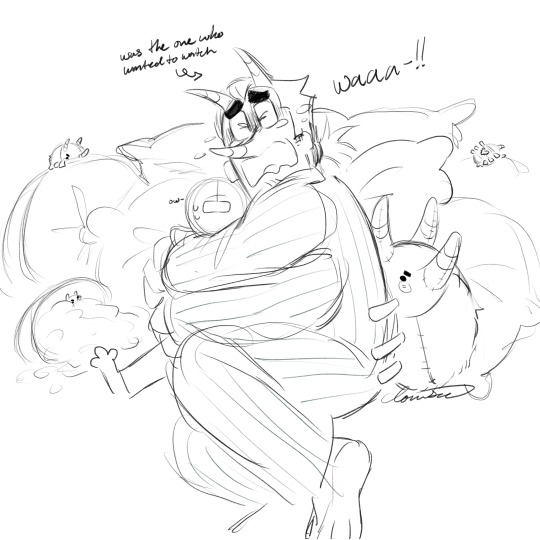
He’d be the type to be like “yeah babe let’s go watch a scary movie together so you can be scared and I can cuddle u all protective-like nYEHEHEHEH *sparkling rizz eyes*” and then IMMEDIATELY be terrified in the first 10 minutes smhh
cw big ol cleaver/knife

This is mostly an excuse to draw my boi in another one of my boi’s clothes- aka Robert c o u g h-
also him as a killer? Absolute total c h a o s- he can be quite cute and quirky at first but slowly get chaotic and go crazy go stupid smhhh. Similar to his mob version where he can get absolutely violent and chaotic, except he’s just almost nothing but that in this-
also if he was anything but the killer he’d be the first person to be killed LMAOOO
#Drawing him with his hair down feels weird smhhh#Welcome home#welcome home oc#robbie robs#Would he have obsessive traits as a killer? Probably smhhh#Unlike my other boy- Robbie is very much an attention seeker#Loves being the center of attention and can get jealous quite easily
1K notes
·
View notes